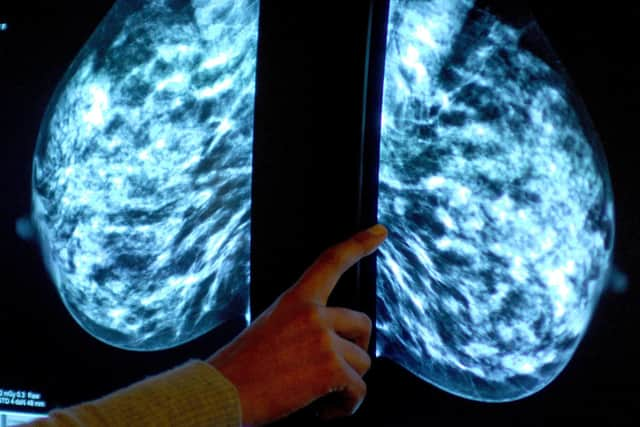Breast screening uptake in Blackpool remains below pre-pandemic levels, new NHS figures show
and live on Freeview channel 276
Breast screening uptake in Blackpool remains below pre-pandemic levels, new figures show.
It comes as charities have said women still face too many barriers to regular testing, as fewer people in England underwent tests than before the coronavirus pandemic
Advertisement
Hide AdAdvertisement
Hide AdAnyone registered with a GP as female will be invited for NHS breast screening every three years between the ages of 50 and 71.
NHS England figures show 8,315 of the 12,825 people invited for a screening in the former NHS Blackpool CCG had a test in the year to March this year.
It meant uptake of the screening stood at 65% – up from 56% the year before, but below pre-pandemic levels of 66% in 2019-20.
Whereas in neighbouring Fylde and Wyre breast screening uptake surpassed levels recorded before the coronavirus pandemic.
Advertisement
Hide AdAdvertisement
Hide AdNHS England figures show 8,220 of the 11,305 people invited for a screening in the former NHS Fylde and Wyre CCG had a test in the year to March this year.
It meant uptake of the screening stood at 73% – up from 66% the year before, and above pre-pandemic levels of 67% in 2019-20.


Dr Claire Knight, senior health information manager at Cancer Research UK, said: "Breast screening is an important tool for spotting the early signs of breast cancer at a stage when treatment is more likely to be successful.
"The current evidence suggests that breast screening reduces the number of deaths from breast cancer by about 1,300 a year in the UK."
Advertisement
Hide AdAdvertisement
Hide AdShe added there are various reasons why people may not engage with screening, from practical barriers around attending appointments to fear about a potential diagnosis.
"Tackling barriers is important to ensure that everyone who wants to take up their screening invitation can find it easy to do so," she said.
The figures show breast screening uptake across England increased to 65% last year from 63% in 2021-22. However, it remained well below pre-pandemic levels when 70% was recorded.
Melanie Sturtevant, associate director of policy, evidence and influencing at Breast Cancer Now, said: "It’s deeply worrying that breast screening uptake remains well below the minimum 70% target, as it plays a vital role in saving lives from breast cancer.
Advertisement
Hide AdAdvertisement
Hide Ad"While small improvements have been made in the percentage of women taking up their breast screening invite, this data makes clear that uptake has barely risen above the record low levels seen during COVID-19."
She added "far too many" people face barriers and difficulties accessing screening, and government investment is needed to make the programme more accessible and convenient.
An NHS Spokesperson said – despite a fall in the number of women responding to invitations – the breast screening programme has eliminated the COVID backlog.
They said: "The NHS is sending out more breast screening invitations than ever before, so anyone who has received an invitation should make an appointment – it could save your life."
Advertisement
Hide AdAdvertisement
Hide AdA Department of Health and Social Care spokesperson said: "It is vital to detect cancer as early as possible, and more than 2 million eligible women received breast cancer scans last year, up significantly on the previous two years.
"NHS breast cancer screening has been recovering since the height of the pandemic, and earlier this year we invested a further £10 million for 29 new breast screening units, and over 60 life-saving upgrades to services in the areas where they are most needed."
Comment Guidelines
National World encourages reader discussion on our stories. User feedback, insights and back-and-forth exchanges add a rich layer of context to reporting. Please review our Community Guidelines before commenting.
